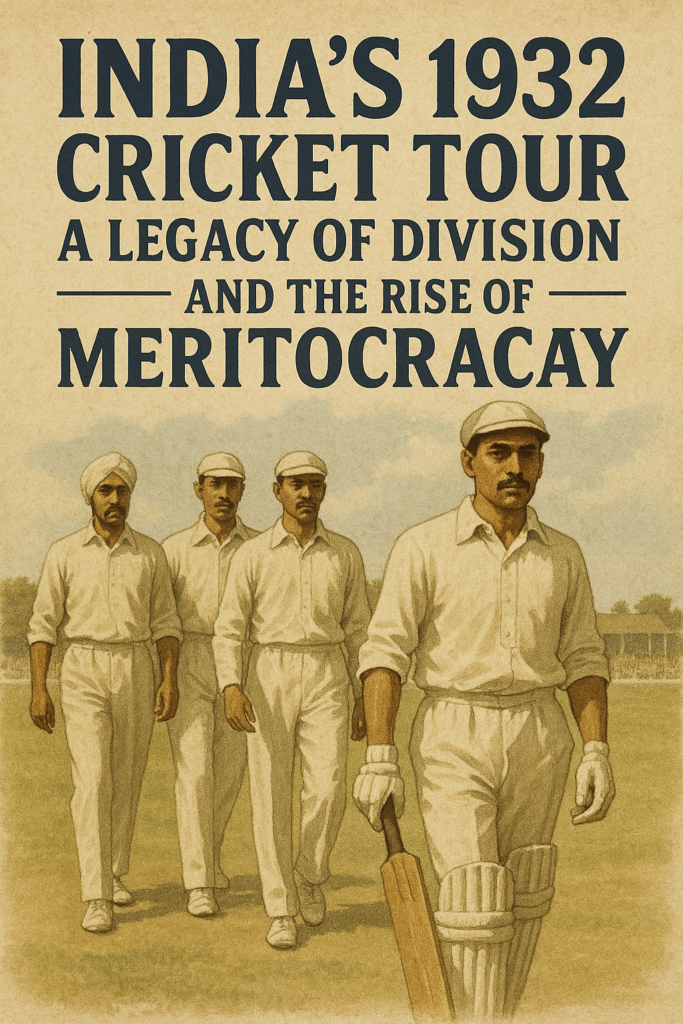Explore the controversial selection process of India’s first official cricket tour to England in 1932, revealing how colonial policies impacted team selection and the fight for meritocracy in Indian cricket.
India’s 1932 Cricket Tour: A Legacy of Division and the Rise of Meritocracy
Cricket, a game often synonymous with fair play, was far from equitable in its early days in India. The 1932 Indian cricket team’s tour of England wasn’t simply a sporting event; it was a microcosm of the colonial struggle, showcasing how the British ‘divide and rule’ strategy infiltrated even the playing field.
This article delves into the team’s controversial selection, highlighting the fight for meritocracy against a backdrop of religious and caste-based quotas.

A Quota System: Seeds of Division
The selection process for India’s maiden official international tour was far from meritocratic. Accounts shared by the legendary Pakistani cricketer Majid Khan, based on stories from his father, Dr. Jahangir Khan, reveal a system rife with religious and caste quotas.
This wasn’t about picking the best players; it was about ensuring representation from various communities, mirroring the British strategy of maintaining control through division.
Players like Lall Singh, a Sikh cricketer, were likely selected to fulfill a quota rather than purely on cricketing ability. While Singh’s performance wasn’t disastrous, it starkly illustrates the systemic bias. Talented players were overlooked, hindering the development of a truly merit-based cricket system.
Missed Opportunities: Giants on the Sidelines
The 1932 team’s story isn’t just about who played; it’s also about the colossal talent left out. Kumar Shri Duleepsinhji and Nawab Iftikhar Ali Khan Pataudi, exceptional cricketers, declined participation.
Duleepsinhji, having already played for England, was advised by his uncle, Ranji, to avoid the potentially unfair selection process. Pataudi, impressed by England’s Gentlemen vs. Players matches, decided against joining due to concerns over the captain’s controversial ‘bodyline’ tactics.
These missed opportunities represent a significant loss for Indian cricket, a direct consequence of the flawed selection system.
The Khan Family Legacy: A Multi-Generational Story
Majid Khan’s insights provide a unique perspective, offering a family history interwoven with the complexities of the 1932 tour. His narrative extends beyond his father’s experiences, touching upon the cricketing careers of his cousin, Javed Burki, and the legendary Imran Khan.
Their journey underscores the enduring impact of colonialism and the unwavering dedication of a cricketing family.
The 1932 Test: A Milestone Despite the Flaws
The 1932 Test match holds immense historical significance. Despite the flawed selection, it marked India’s entry into the world of international cricket. It serves as a stark reminder of the struggle for recognition and fair play in the face of colonial interference.
This match marked a beginning, albeit a complicated one, paving the path for future generations of Indian cricketers.
Conclusion: A Lesson in Meritocracy
The 1932 Indian cricket team’s story highlights the vital importance of meritocracy. Majid Khan’s account reveals the damaging consequences of colonial policies that prioritized communal representation over talent.
Yet, it’s also a testament to the resilience of players like Duleepsinhji and Pataudi, who pursued excellence despite the challenges. Their struggles underscore the ongoing pursuit of fair play and merit in Indian cricket, a pursuit that continues to shape the sport today.
The multi-generational story of the Khan family adds another layer to this compelling narrative of dedication, passion, and the enduring legacy of colonialism’s impact.
Reference: WCric

